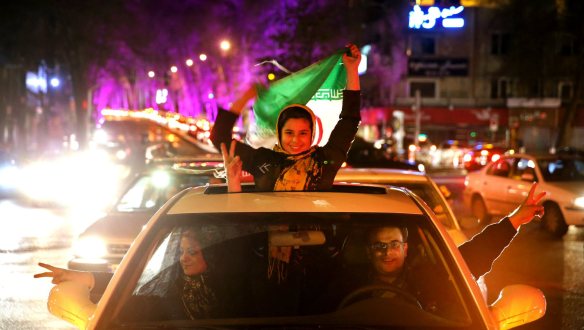Economic sanctions have long been a means utilized by countries and International governmental organizations to exert influence over other states or economic powers, better their own self-interest and security, as well as to attempt to deter human rights violations or actions seen as negative towards the international community. Economic sanctions can range in severity from the embargo of goods produced by private institutions, to the freezing of assets and the near total embargo of a good, travel, or even trade from a state as a whole.
The United States issues more sanctions than any other state or organization in the world. The United Nations and the European Union also issue sanctions on a large scale. Much of the time, sanctions are viewed as a powerful tool of influence for foreign policy makers. But in viewing sanctions as simply a means to an end, the true nature of sanctions and the impact they have on the economy and population of the targeted state can go under the radar.
Perhaps one of the most heavily sanctioned nations in the world is Iran. Next to Cuba, the United States sanctions brought against Iran are the longest lasting economic sanctions “program” in the history of the U.S. Economic sanctions were first levied against Iran in the midst of the Iran hostage crisis, and were initiated by President Jimmy Carter. Since then, the sanctions have been consistently renewed and the penalties increased, though the reasoning behind them has evolved. Much of the sanctions brought against Iran are due to agreements in the Iran-Iraq Non-proliferation Act of 1992, which specifies that sanctions be brought against any person or entity that helps Tehran in the acquisition of weapons or their development. A goal of the sanctions was to bring the Iranian government to the negotiating table regarding their weapons program, with the hopes of coming to an agreement that would allow inspections into the nuclear program, to see that the production of WMD’s is not occurring.
Some of the most severe economic sanctions brought against Iran include the 1995 U.S. trade embargo, which prohibits the majority of U.S. firms from trading or investing in Iran. Following September 11th, 2001, Iranian assets in the U.S. were frozen, and travel bans were put into place. Furthermore, Iran or any institution having dealings with Iran is prohibited from using the U.S. dollar, which spells disaster for international banks, because of the dollars strength. Probably the most punishing sanction brought against Iran has been the embargo on Iranian oil exports. Before the sanctions, oil made up half of the Iranian governments revenue, and since the embargo Iranian exports of oil have more than halved.
While the goals of the sanctions levied against Iran are for the most part based on the intention of eliminating or preventing the development of a nuclear weapons program, and for facilitating nuclear arms proliferation in the country, the economic impact of sanctions on Iran and its people have been devastating.
The additional sanctions brought against Iran have resulted in a loss of $17.1 billion in revenue. Iranian foreign investment fell to almost nothing in 2012, from its previous 4 billion. While these figures largely represent blows to the Iranian oil market, the effects of the sanctions trickle down to the population as a whole. Strict sanctions can effectively impoverish a civilian population, and make it difficult to acquire, or deprive them of adequate food, technology, and health care. Not only are the Iranian people negatively impacted, but also it has been estimated that if the oil embargo on Iran were to be lifted, world oil prices would drop by 14 percent.
With all of this in mind, the question that may be asked is are sanctions a truly effective means by which states and international governmental organizations can persuade an “errant” state or institution into cooperation? Or are sanctions more a means of posturing; a display of power, and a method of isolating and shaming nations in the international community than an effective tool for incentivizing cooperation? If so, are the negative impacts that sanctions have for the targeted states economy, the world economy, and the civilian population worth those costs? And, do you think the recent Nuclear deal with Iran will culminate to any economic sanctions being lifted?





Thank you for writing this very informative blog post. I have heard of Iran having to face sanctions but did know of the various economic impact it has made. I am surprised to learn that Iran is one of the most highly sanctioned countries in the world
LikeLiked by 1 person
I think Iran is starting to get the point. They’ve been sanctioned for a while and most critics would argue that these sanctions are taking too long or they are just plain ineffective. The way i see it is that these sanctions are constantly evolving and it is costing the Iranians every year their economic revenue. development, and reputation in the international community. Iran is being made an example to other countries as to what happens when you don’t comply with international law.
LikeLiked by 1 person
I agree that an example is being made out of Iran. But then I believe that there is something seriously flawed (if not outright hypocritical) in a nation or international organization imposing sanctions on a state for presumably developing a weapons program in violation of international law when nine nations (among them the most powerful and influential in ratifying these international laws) currently are in possession of nuclear weapons themselves. One can look deeper into the issue and assume that Iran is targeted because of a perceived threat or hostility. But then, how many countries in the world would be able to point a finger at the United States, and call us a perceived threat? Just some thoughts.
LikeLiked by 1 person
Thank you for your blog post.
I could see that sanction on Iran affected various part of economics in Iran. It shows that how much sanction of international countries could make one nation to face harsh economic situation. Nowadays, countries are hard or even impossible to survive without other countries because the world become more closer than before. We share lots of products and services across the nations and some resources are hard to obtain without trade with other countries. I think this post shows that how much international sanctions on certain country could be a great strategy to have a great diplomacy.
LikeLiked by 1 person
The effectiveness of sanctions are always disputable. A country such as China could decide to ignore the sanctions and trade anyways, what is the U.S. to do then? We can’t really use force against China and sanctions against them would have a strong impact on our economy too.
LikeLike